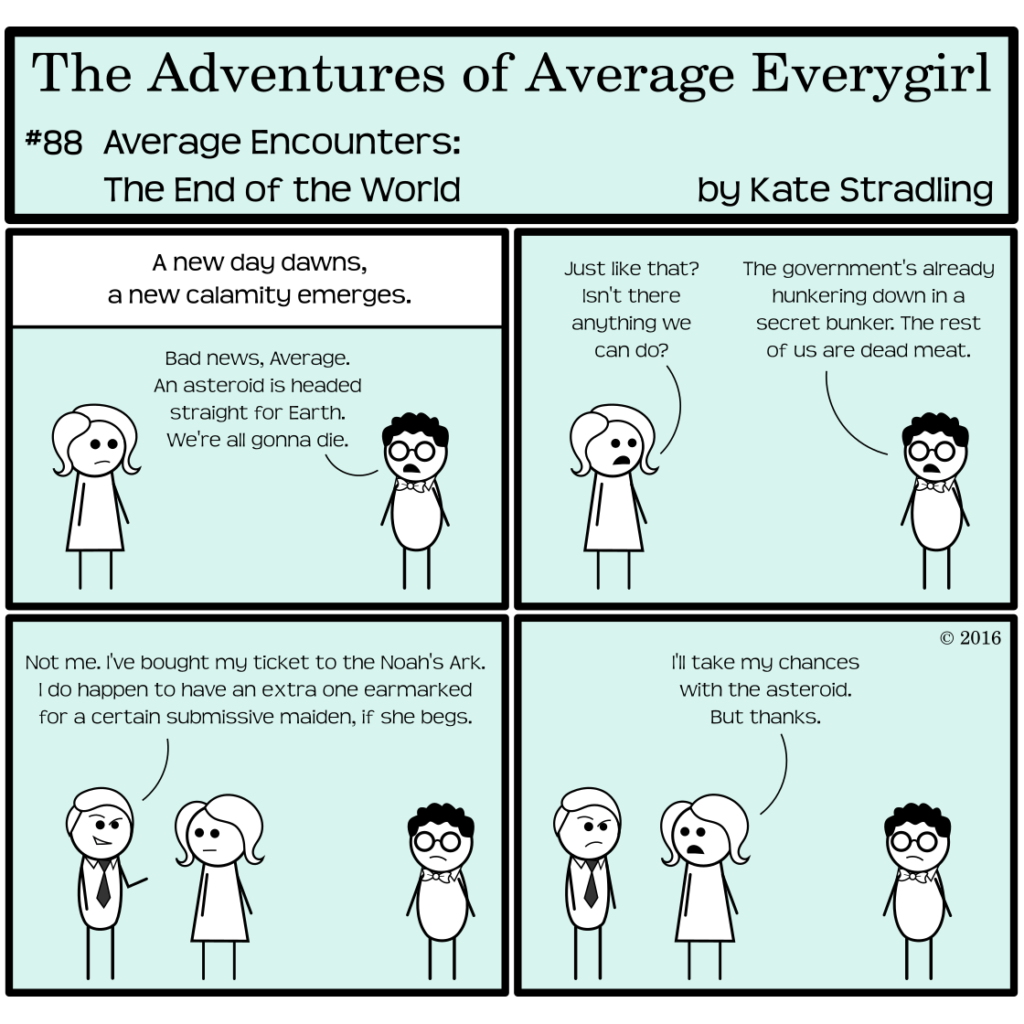
Doomsday catalysts come in many flavors: asteroids, volcanoes, earthquakes, alien invasions, global warming, global thermonuclear war, and so forth. These cataclysmic events project such an epic scale of destruction that they threaten the existence of all life on earth.
If they legitimately occur, that is.
Death from the Sky
The asteroid holds a special place in this genre. Referred to in some circles as the Sweet Meteor O’Death (or SMOD, colloquially), it reigns as the ultimate doomsday trigger because
- There’s precedent (sorry, dinosaurs!),
- Its advent is beyond human control (thanks, physics!), and
- It leaves enough time between discovery and impact to layer drama thicker than the icing on Sandra Lee’s infamous Christmas cake (oh, the sugary suspense!).
Doomsday Divide-and-Conquer
This plot device lends well to a division of story lines: one each for the government character, the scientist, and the Ordinary Joe at minimum. And when it’s introduced, you can pretty much bet there will be a Noah’s Ark involved, because governments habitually sink tons of money into prepping for doomsday survival.
The Noah’s Ark can be a space ship or an underground bunker. Regardless of its form, it boasts three major features:
- Safety and survival from the extinction-level destruction
- A scarcity of space when compared with the population as a whole
- A scarcity of resources to last through the full duration of the calamity
Which brings to another type of division within this genre:
The Elites vs. the Non-elites
Whenever a Noah’s Ark comes into play, characters get weighed on a scale of worthiness to enter. The government types—usually the President of the United States or some other high-ranking super-elite official—have rubber-stamped access to the Ark. The scientist types are the best in their field (of course), and thus get a pass to the Ark but possibly struggle with the ethical dilemma of whether to retreat to safety or to continue fighting against the planet’s impending doom because they’re so very noble.
And the Ordinary Joes? They’re toast. But they will have an angst-filled, poignant struggle, oozing with pathos to drive home to the audience the desperation of their circumstances. And sometimes they even win against the cataclysmic force that threatens their demise (though not without sacrifice, natch).
Non-elite though the Ordinary Joes may be on the social scale, on the narrative one, they are gold.
A Different Kind of Elite
From a literary standpoint, this second division of Elites vs. Non-elites is more important than the first. The protagonist of every story is, by default, a Narrative Elite. Their perspective is more important to tell than the millions of people around them, than the scores that they interact with throughout the story’s progress. They are special, even if they are only “ordinary”—and often because they are only “ordinary.”
While their also-ordinary peers picket the entrance to the Noah’s Ark or present faces of miserable martyrdom, the Ordinary Joes pull up their bootstraps and face their calamities head on. They act with full intent to triumph or to die trying. They present an ideal that invokes the reader’s admiration and empathy.
Thus, the Ordinary Joe is perhaps the most important character in a doomsday story. We, the ordinary audience, are each the hero of our own life. The Ordinary Joe provides an avatar, a window for where we might aim to fall if such a cataclysm ever should occur.
They are, in short, not ordinary at all.
(But they’re still not elite enough to pass into safety uncontested. Haha.)